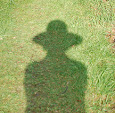Bournmouth University's Emeritus Professor Seán Street was discussing his new book 'The Poetry of Radio, The Colour of Sound on BBC Radio 4 today.
"The book explores the imaginative connections between radio and poetry, looking at how poets have used sound since before the printed word, providing narrative through the music of the world that surrounds us." (Quote taken from his website here.)
On the radio programme here Libby Purves and guests were talking about the aesthetics of ordinary
radio [9.40 minutes in] i.e. accidental poetry as opposed to a given poem
being read out. Prof. Street maintained that "radio, at its heart, is a
poetic medium… There are magical moments, particularly in the
vernacular…. and also when people get emotional…. Language can become
transcendent and they move into a poetic sort of utterance."
For
example, there were Radio Ballads produced in the 1950s and 1960s. The
very first one was a ballad about a railway accident The Ballad of John Axon in which an engine driver was killed.
Charles Parker the
producer was reporting on this accident in the days when BBC journalists/broadcasters went out with
notebooks and wrote down what people said and then actors read it. They
were just going over to the use of a tape recorder for interviewing at this particular time when he talked to one man about why railways were important. The man said
it was a tradition, it was part of your life;
railways went through the back of your spine like BLACKPOOL went through
rock*.
______________________________________________________
To explain: *rock is hard sugar sweet in the shape of a stick; a stick of candy a bit like a candy cane without the hook. It is usually white with a red outside colour on it. The lettering, in red, of the town or city is incorporated into the stick so that when you suck on it the name of the town is always there. That being said, Edinburgh Rock is a different species but that is another story.
Photo is of the West Highland steam train that I took in Mallaig a couple of years ago.





No comments:
Post a Comment